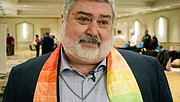United Methodist Church keeps ban on gay clergy, same-sex marriage
Free Press wire reports | 3/8/2019, noon
ST. LOUIS
“We’re in this to the end,” sang LGBTQ United Methodists and their allies.
They prayed. They hugged. They pulled out more chairs as people packed a worship service hosted by the LGBTQ-affirming Love Your Neighbor Coalition on Feb. 27 in a hotel meeting room, a day after a three-year push to make their church more inclusive had been blocked.
Many at the worship service committed to staying in a denomination that voted on Feb. 26 to reiterate language in the Book of Discipline, its rulebook, saying LGBTQ people could not marry or be ordained in its churches.
“Our work is to live like that Book of Discipline no longer exists and to be the church,” said the Rev. David Meredith, an Ohio pastor who has faced denominational discipline hearings since he married his longtime partner in 2016.
“Let us not step back from challenging, resisting, everything — ignoring the book so that we can simply be beloved children of God and the beloved people of God,” Rev. Meredith said.
The 864 delegates to the United Methodist Church General Conference, the global denomination’s decision-making body, passed the Traditional Plan, the most conservative of three plans proposed, with 53 percent of the vote.
The plan strengthens the enforcement of language regarding LGBTQ United Methodists written into the rulebook in 1972 that states “the practice of homosexuality is incompatible with Christian teaching” and that “self-avowed practicing homosexuals” cannot be ordained as ministers, appointed to serve or be married in the church.
The special session in St. Louis of the General Conference, it was hoped, would allow the church to move forward together despite deep, decades-long divides over the inclusion of its LGBTQ members. The three plans were presented by a specially appointed Commission on a Way Forward that delegates had approved when their regular 2016 meeting came to a stalemate over the debate.
The options also included the One Church Plan, recommended by the denomination’s Council of Bishops, that would have allowed individual churches and regional conferences to decide whether to ordain and marry LGBTQ people.
But LGBTQ United Methodists and their supporters still see reason for hope.
In April, the Traditional Plan goes to the denomination’s top court, the Judicial Council, which already has found parts of it to be unconstitutional. Not all of those parts were able to be amended by delegates before they approved the plan.
(In Richmond, the Rev. Matthew Bates, senior minister, and Joe Speidel, church council chair, at Centenary United Methodist Church in Downtown issued a statement saying the congregation is “deeply disappointed” by the decision made by the General Conference, noting it has “created a deeper division within the United Methodist Church.”
“We disagree with the current church policy, which states that ‘the practice of homosexuality is incompatible with Christian teaching,” Dr. Bates and Mr. Speidel stated. “We intend to continue to be an open church, fully inclusive and open to all God’s children across the theological and social spectrum.”)
The vote hurt many who support a full welcome of LGBTQ members.
Jen Ihlo, a delegate from the Baltimore-Washington Conference, said it is hard for her to believe the Judicial Council “will do the right thing,” she said. “But we’ll see.”
Numb and exhausted after the General Conference, Ms. Ihlo said she came to the Love Your Neighbor Coalition’s worship service because she needed to be with her community and will later figure out her next steps.
“I was baptized and confirmed in the United Methodist Church, but that church doesn’t seem to exist anymore. It’s judgmental. It’s divisive, it’s harmful. And that’s not what Jesus preached,” she said.
“That was why I needed to be here. And that’s what I was hoping for and fighting for as a delegate.”
The Wesleyan Covenant Association Council also met Feb. 27 and 28 to analyze the decisions made by the General Conference and determine its next steps.
Before the vote, the Rev. Keith Boyette, president of the WCA, had said he would recommend the association leave the United Methodist Church and form its own denomination if LGBTQ members were permitted to become clergy and marry. But following the vote, Rev. Boyette said such a split was “unlikely.”
The Rev. Adam Hamilton, a prominent pastor and delegate from the Great Plains Conference who had advocated the One Church Plan, said approval of the Traditional Plan alienated not just progressive United Methodists, but also those in the middle. A number of people who hadn’t been engaged in the debate, were now hurt, angry and energized, he said.
“I ain’t going nowhere,” said Adama Hathaway-Brown, a certified candidate for ministry in the New England Conference, who identified herself as a “same-gender-loving woman.”
“There are just too many people to serve and I’ve come way too far to leave them now.”
In her conference, she said, there are people to feed at the soup kitchen; veterans and senior citizens to reach; and a number of people wanting to worship in a community that welcomes and affirms LGBTQ people. They were there before the General Conference, she said, and they are still there after the meeting.








